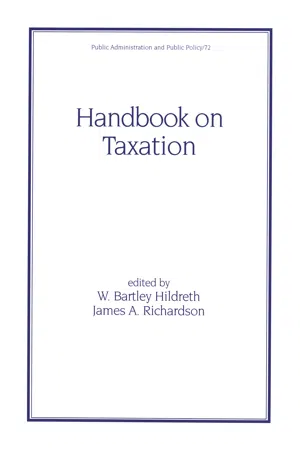Corporate Tax
Corporate tax is a levy imposed on the profits of businesses by the government. It is calculated based on the company's net income and is a key source of revenue for the government. The rate of corporate tax varies by country and can have a significant impact on a company's financial performance and investment decisions.
6 Key excerpts on "Corporate Tax"
- eBook - ePub
- Raghbendra Jha(Author)
- 2009(Publication Date)
- Routledge(Publisher)
...19 Tax incentives and Corporate Taxation DOI: 10.4324/9780203870044-19 Key concepts: Corporate Tax policy; tax competition, tax incentives; tax holidays; effective tax rates. 19.1 Introduction This chapter deals with some issues relating to Corporate Taxation in a modern open economy. We first discuss the broad rationale for a corporation tax. Then we discuss various tax incentives that have been studied in the context of corporate profits. Finally, we compute effective tax rates in the context of modern tax structures designed to stimulate investment. Corporate Taxation is a key element of modern tax structures. However, in a distinct sense the rationale for a corporation tax is tenuous. If corporations are ultimately owned by shareholders then corporate profits should not be taxed separately as these are taxed as dividend and/or income tax. Two justifications for a separate Corporate Tax have been discussed in the literature: first, a considerable fraction of profits are retained by the corporations and are not taxed (at least in the same period as the profits are realized) at the level of the individual since these profits do not accrue to individuals; and, second, there may be monopoly elements in the corporate sector necessitating corrective taxation on their own. The Corporate Tax or corporate income tax differs from the individual income tax in two major ways. First, it is a tax not on gross income but on net income, or profits, with permissible deductions for most costs of doing business. Second, in many countries it applies only to businesses that are chartered as corporations – not to partnerships or sole proprietorships. In some countries the Corporate Tax is a flat percentage amount whereas in some other countries (e.g., USA) different tax rates apply to different profit brackets. The rationale for this is that the lower tax rate is supposed to benefit small corporations...
- eBook - ePub
- Christopher May(Author)
- 2015(Publication Date)
- Routledge(Publisher)
...Increasingly there seems a public perception that there is a putative “fair” level of taxes one might expect corporations to pay, which in recent popular commentary on Corporate Taxation has begun to distinguish between the letter and the spirit of the law; 3 certainly “tax planning” can reduce the tax exposure of global corporations, but if corporations wish to be seen as socially responsible, is following the letter of the law enough? Thus, quite apart from the legal issues, now Corporate Tax seems to also include a political issue around social reputation, as indicated by Starbucks’ “voluntary” payment of corporation tax (by foregoing potential allowances) after a public outcry. 4 In other words, for global corporations alongside the legal issues, taxation is becoming part of brand management. In the most general terms tax has two primary and general functions: firstly, it allocates a society’s resources between an authority empowered to collect taxes, through a collective decision-making procedure, and private individuals who have accumulated the resources in the first place. Taxation is how the state gathers together resources to solve collective action problems...
- eBook - ePub
- W.Bartley Hildreth, W.Bartley Hildreth(Authors)
- 2019(Publication Date)
- Routledge(Publisher)
...Although substantial, the share of government receipts from the Corporate Tax has been falling, and represents less than 12 percent of overall receipts (Fig. 2). 12 Table 1 Selected Items Included in the U.S. Corporation Income Tax Base, 1993 (Dollar Values in Millions) III. ECONOMIC AND BEHAVIORAL EFFECTS OF THE CORPORATE INCOME TAX As with any tax, the existence of the Corporate Tax may alter the behavior of those subject to it as they seek to minimize their tax liability or invest in tax-favored activities. Indeed, concerns over the neutrality of the corporate income tax have been cited as the reason for any number of proposed and enacted changes in the tax code. By neutrality it is meant that the tax system should not change the relative rates of return on different investments from what they would otherwise be in equilibrium in the absence of taxation. 13 In the following four sections we discuss the reasons why taxes might be expected to influence specific aspects of firm’s behavior. These sections are not meant to be a comprehensive review of taxes on corporations, but rather highlight areas that have received particular attention: organizational form, capital structure, capital investment, and dividend policy. It is important to note, however, that taxes are only one of the many financial and nonfinancial factors firms must consider when making decisions. As a result, the advantage-or disadvantage-of undertaking any action because of taxes may be mitigated or completely offset by other considerations. 14 Figure 2 Corporate income tax receipts. From Executive Office of the President (1996). A. Organizational Form One of the earliest and most fundamental decisions a business must make is the type of organizational form it will use. 15 Businesses must choose among operating as a sole proprietorship, a partnership, or a corporation—each with its own nontax and tax advantages and disadvantages...
- eBook - ePub
Public Sector Revenue
Principles, Policies and Management
- Alberto Asquer(Author)
- 2017(Publication Date)
- Routledge(Publisher)
...In the US, corporate income tax is progressive, with (at the time of writing) eight tax rates starting from 15% up to 35%. Many countries in the world, instead, implement a flat tax rate (e.g. about 33% in France, 32% in Japan, 31% in Italy). Some countries have adopted relatively low tax rates, such as, for example, the UK (20%), Russia (20%), Singapore (17%) and Ireland (12.5%). A few countries (which fall into the category of so-called ‘tax havens’, which will be discussed in a subsequent chapter) do not levy any Corporate Tax, such as, for example, in the Bahamas, Bahrain and the Cayman Islands. The actual burden of corporate income tax may not be fully appraised on the basis of the tax rate alone. In many countries, the tax code can include provisions for special deduction and exemption schemes or for additional surcharges. The Netherlands, for example, may be considered a tax haven because of special exemptions (e.g. on capital gains and dividends from qualifying subsidiaries and foreign branches). In most countries, moreover, the total amount of taxes that business entities pay also includes other forms of taxation, such as contributions to social security for employees and property taxes on real estate. The World Bank ‘total tax rate’ index provides a clue to the total burden of taxation on corporations. According to this index, countries like France, Italy and Spain have relatively high levels of total Corporate Taxes, at aggregated rates of 62.8%, 62.0% and 49.0%, respectively. Other countries, like Kuwait, Saudi Arabia and Singapore, have relatively low total Corporate Taxes, at aggregated rates of 13.0%, 15.7% and 19.1%, respectively. Also, another main source of public sector revenue, the indirect taxes on transactions, differ considerably across the world. Indirect taxes on transactions take different forms. About 160 countries in the world have adopted VAT (OECD, 2014)...
- eBook - ePub
- Jeffrey Taylor(Author)
- 2017(Publication Date)
- Routledge(Publisher)
...13 Taxation Corporate income tax Most countries have some kind of tax assessed on the profits earned by forprofit corporations. This rate can vary widely from ten to thirty percent, and in some off-shore tax-haven locations, it can be virtually negligible. In the United States, it will be assessed on both the federal and state level, though some states have very low state-level corporate income tax as an incentive to base the corporation there. Most corporations, both big and small, usually become quite good at minimizing their taxable profits. Art enterprises, usu ally of the small or micro size, will usually immediately re-invest any sizable profits from a successful venture much the same way real estate speculators will quickly invest in a new property. Furthermore, the sad reality is that most art-related businesess really do operate on the very margins of profitability (in fact more often than not on the wrong side of it). Therefore, it is not surprising that most pay very little in the way of corporate income tax. Smart dealers who earn profits usually do reinvest it promptly in new inventory, updated infrastructure, or better real estate, and all of these activities can legitimately reduce a year-end tax burden. Dealers with an inclination toward tax-avoidance will often try to keep some transactions in cash or with reduced invoices. Those working on a global scale may use international transactions, free ports, and off-shore companies to reduce their declared profits. It must also be noted that given the small size of most art businesses, and the fact that they are usually sole-proprietorship enterprises, there often exists little difference between corporate profits and the owner’s personal income...
- eBook - ePub
- Clive Marsh(Author)
- 2012(Publication Date)
- Kogan Page(Publisher)
...At Federal level there are the three administrations of tobacco, alcohol and firearms taxes administered by the Alcohol and Tobacco Tax and Trade Bureau. Other domestic taxes are administered by the IRS (Internal Revenue Service). Import taxes are administered by the US Customs and Border Patrol. Each state has its own tax administration, and some states administer local taxes. Your finance director or taxation manager will, of course, be your first contact on tax questions. If this is not possible, then it is often useful in the first instance to simply visit the website of the appropri ate admi nistration and search under the subject of your concern. The HMRC site in the UK is excellent. It provides online answers and also the contact numbers for each specialist area. Many topics are not so clear-cut, and you might then seek legal advice from a tax lawyer or the advice of a tax accountant. Taxes on companies and corporations Residence and the charge to corporation tax Taxation on companies in the UK is referred to as corporation tax. In other regimes it may be referred to as business tax. For the purpose of this section I will make reference to the UK system of corporation tax since the principles are similar. UK corporation tax is a tax that is charged on the global profits and chargeable gains of UK-resident companies. UK corporation tax is not charged on the dividends received from companies that are resident in the UK. A similar system applies in most other countries. A company that is not resident in the UK but trades there through a branch or agency may also find that its profits are chargeable to UK corporation tax. It is, therefore, important to understand all cross-border taxation implications of any overseas operations or plans. Periods of assessment Taxation periods of assessment may be different from accounting periods of assessment...





